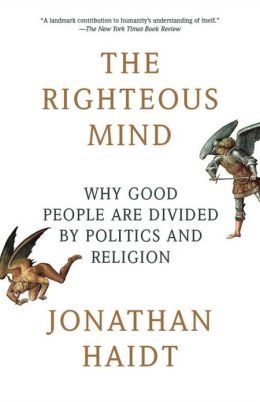Read Part 1

Haidt's Definition of Moral Capital: "The degree to which a community possesses interlocking sets of values, virtues, norms, practices, identities, institutions, and technologies ... [that] enable the community to suppress or regulate selfishness and make cooperation possible.
More on the liberal/conservative divide that is explored in Jonathan Haidt's book The Righteous Mind. Today we present the second of two sets of excerpts from the book, which The Guardian called "a compelling study of the morality of those on the left and right [that] reaches some surprising conclusions."
- No matter how good our logic, it's not going to change the minds of our opponents if they are in combat mode, too. If you really want to change someone's mind on a moral or political matter, you'll need to see things from that person's angle as well as your own. And if you do truly see it the other person's way — deeply and intuitively — you might even find your own mind opening in response. Empathy is an antidote to righteousness, although it's very difficult to empathize across a moral divide.
- At YourMorals.org, we have found that social conservatives have the broadest set of social concerns, valuing all six foundations relatively equally. This breadth — and particularly their relatively high settings on the Loyalty, Authority, and Sanctity foundations — give them insights that I think are valuable.
- People whose genes gave them brains that get a special pleasure from novelty, variety, and diversity, while simultaneously being less sensitive to signs of threat, are predisposed (but not predestined) to become liberals.
- Conservatives are "the party of order and stability", in [John Stuart] Mill's formulation. They generally resist the changes implemented by the "party of progress or reform". But to put things in those terms makes conservatives sound like fearful obstructionists, trying to hold back the hands of time and the "noble human aspirations" of the liberal progressive narrative. A more positive way to describe conservatives is to say that their broader moral matrix allows them to detect threats to moral capital that liberals cannot perceive. ... They fight back ferociously when they believe that change will damage the institutions and traditions that provide our moral exoskeletons (such as the family). Preserving those institutions and traditions is their most sacred value.
- I suggested that liberals might have more difficulty understanding conservatives than the other way around, because liberals often have difficulty understanding how the Loyalty, Authority, and Sanctity foundations have anything to do with morality. In particular, liberals often have difficulty seeing moral capital, which I defined as the resources that sustain a moral community.
Haidt's Definition of Moral Capital: "The degree to which a community possesses interlocking sets of values, virtues, norms, practices, identities, institutions, and technologies ... [that] enable the community to suppress or regulate selfishness and make cooperation possible.
